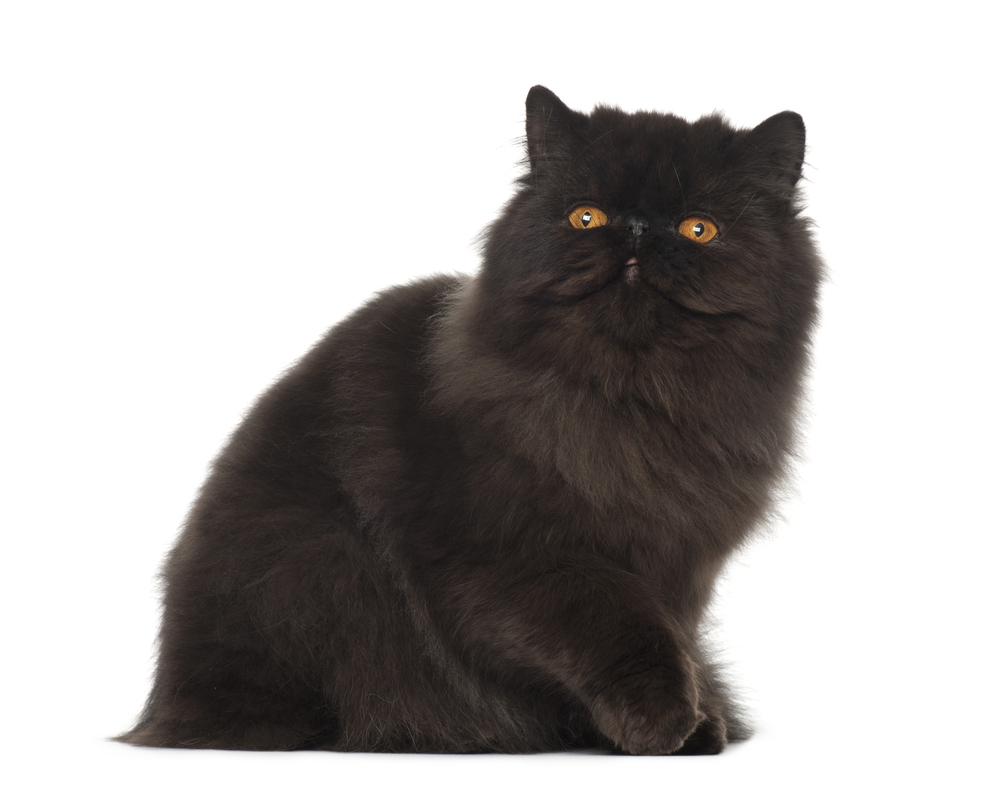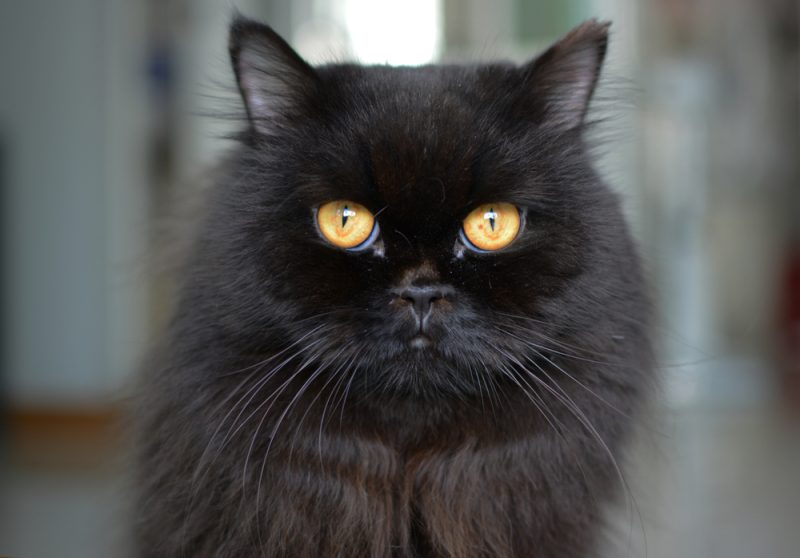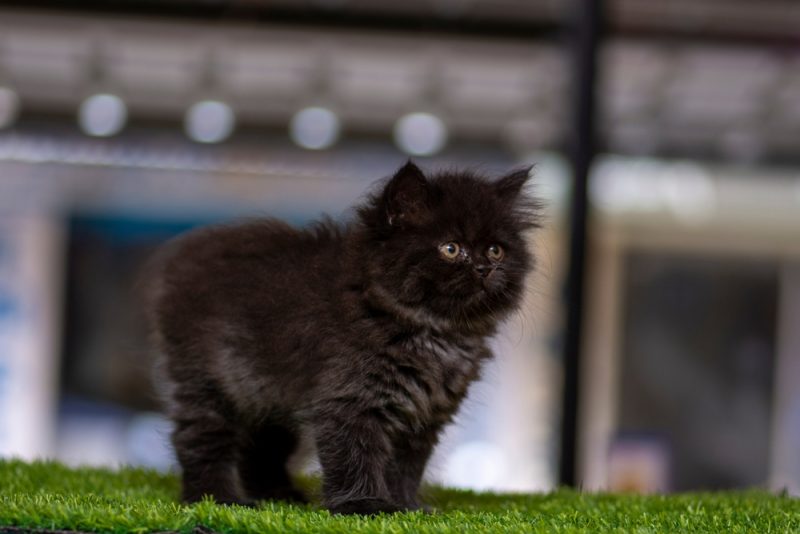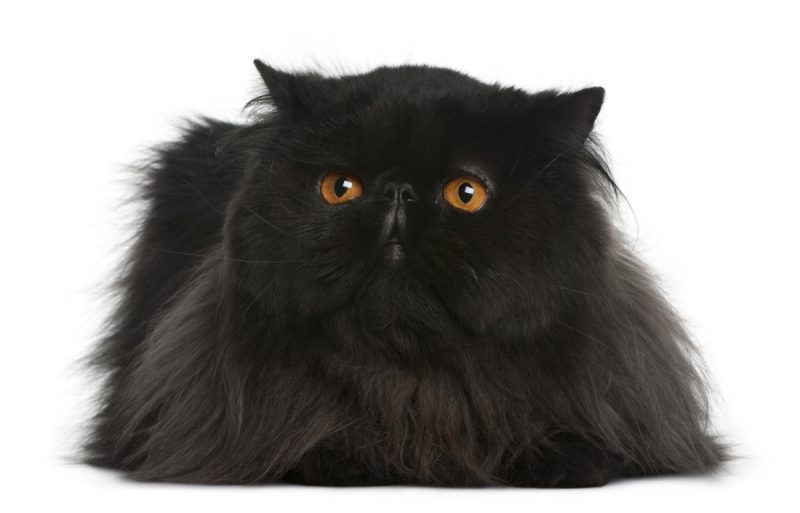- June 30, 2024
Black Persian Cat: Facts, Origin & History (with Pictures)

The Persian cat has long impressed onlookers with its regal appearance and stunning coat. They are one of the oldest cat breeds to exist, coming in a variety of colors, including black. When exactly did the black Persian become a thing? Since the very beginning, it is still a pretty rare color compared to colors like gray and white!
In this article, we’re going to go over the Persian breed, how they came to be, and where they are today! Maybe you will get to the end of the article and decide it’s time for you to bring home one of your very own.
Breed Overview
Colors:
Black, but they also come in any other color you can think of
Suitable for:
Apartment living, multi-pet households, homes with children
Temperament:
Gentle, agreeable, good-natured
Docile, gentle, and good-natured, the Persian will definitely steal anyone’s heart. These floppy cats are cephalic, they have short, pus and snout and shallow globes. This gives way to the classic appearance, appearing much like the pug version of the cat!
They are interesting. They are what draws people in, and their personality is what makes people stay. When a Persian comes in the stunning black color, it looks absolutely gorgeous against their vibrant eyes!
Black Persian Characteristics
Energy
+
A high-energy cat needs a lot of physical and mental stimulation to keep healthy and happy, while a low-energy cat needs minimal physical activity, but still needs mental stimulation. When choosing a cat, It’s important to ensure their energy levels match your lifestyle.
Trainability
+
Cats that are easy-to-train are more willing and skilled at quickly learning prompts and actions with minimal training. Harder-to-train cats are usually more stubborn or aloof and require a bit more patience and practice.
Health
+
Certain cat breeds are more prone to various genetic health problems, and some more than others. This doesn’t mean that every cat in those breeds will have these issues, but they do have an increased risk, so it’s important to understand and prepare for any additional needs they may require.
Lifespan
+
Due to their size or potential genetic health issues of a specific breed, some cats have shorter lifespans than others. Proper nutrition, exercise, mental stimulation, and hygiene also play an important role in your cat’s lifespan and quality of life.
Sociability
+
Some cat breeds are more social than others, both towards humans and other cats and animals. Cats that are more social have a tendency to rub up on strangers for scratches or jump on laps for cuddles, while cats that are less social shy away, hide, are more cautious, and even potentially aggressive. No matter the breed or gender, it’s important to socialize your cat and expose them to many different situations.

The Earliest Records of Black Persians in History
You would think that if you hear the name Persian, you would assume that they came from Persia (present-day Iran). While that is the most popular theory, the truth is that the exact origins aren’t known.
Persian cats are also thought to be the result of breeding Turkish Angoras and other long-haired cats. The modern-day version of the Persian cat began to be established in the 1800s. But recently, research has found that modern-day Persian cats are more genetically related to Western European cat breeds, such as British Shorthairs and Chartreux, which makes sense when you look at their similar facial structure.
Black has always been one of the standard colors of Persians. It isn’t its own particular breed, but rather just a color scheme in the Persian’s versatile lineup.
How Persians Gained Popularity
It is thought that Persian cats eventually made their way to Europe through the spice trade in spice caravans. And what better way to gain popularity than to be favored by the queen? That’s right! Queen Victoria favored the Persian, giving way to its increasing popularity over the years. The breed has encountered decreases in population at certain points throughout history, but they’ve always maintained fairly decent prevalence.
Today, many cat lovers welcome Persians into their homes. Other people go gaga for these kitties, and they’re taking the internet by storm. Since they are ranked in the top 5 most popular cat breeds, you can imagine how abundant the breed is today.

Formal Recognition of Black Persian
The Cat Fanciers’ Association was the first to formally recognize this ancient breed in 1906. Since then, the Persian has made the registry with a list of criteria for the breed standard. The International Cat Association (TICA) also recognizes the breed, as do other prominent cat organizations.
The Top 5 Unique Facts About Persian Cats
Persians are terrific for several reasons—no matter the color. These cats are one of the oldest breeds in kitty history, so it’s no wonder they have so many interesting facts! Here we go!
1. Persians are brachycephalic.
One of the things you like most about the Persian is likely their interesting appearance. On top of having a beautiful long coat, Persians also have slightly pushed-in noses. This gives the Pug-nose appearance people adore, but it means that they are brachycephalic.
Unfortunately, this may lead to these cats having breathing issues associated with the breed itself. It might even put a cat at a greater risk for other health issues.
So, even though it’s not necessarily positive, it is certainly a characteristic of the breed that most people adore.

2. Persians are stars on the set.
While the color black doesn’t really lend to any specific star Persian on TV, many Persians in general have made their appearance in movies and TV. A gray Persian played the role of Duchess in the hit movie Babe. The new hit movie Lyle, Lyle Crocodile also features a beautiful silver Persian named Loretta.
But that’s not all! There are several other Persian cats that have been in films throughout history.
3. Persians can have health issues attributed to their appearance.
As mentioned previously, Persians are prone to several health issues. A study showed that 64.9% of Persian cats had at least one health issue. Kidney disease was the most common cause of death, while a coat disorder was the most common specific issue. Dental problems were also common. Persian cats can also suffer from breathing and eye problems due to their facial shape.

4. Persian cats are very chill.
One of the things that many people seem to love about the Persian breed is their easy-going, relaxed nature. These cats tend to be extremely agreeable and get along with all sorts of creatures, like dogs and animals of their same size. These cats tend to be extremely good with children and make awesome pets for seniors, since they are so easy to make happy.
5. Persians require extensive grooming.
A Persian is not the kind of cat you can have if you expect them to take care of all of their grooming needs a hundred percent of the time. In fact, in order for your Persian to stay mat-free, they will require regular brushing.

Does a Persian Make a Good Pet?
A Persian can make an absolutely extraordinary pet! If you’re a cat lover, you can appreciate their wonderful nature and enjoy brushing their long coats to avoid having shed hair all over your things!
These cats are wonderful additions to bring to virtually any situation. They make great apartment cats, companions for multi-pet situations, and they can make one heck of a good emotional support animal.
If you are thinking about getting a Persian cat, you can find them from local breeders or rescues and shelters. Because this is a decently popular purebred cat, you shouldn’t have a lot of trouble locating one in your state. Definitely look around for different options and don’t be afraid to check to see if kitty needs a second chance at a beautiful life.

Conclusion
Now you understand a little bit more about the black Persian. You know that coat color does not determine anything about personality and it is up to the individual breed to display the traits. Black is among the most beautiful of all Persian colors, and relatively rare to find.
If you want a black Persian in particular, you can reach out to a local reputable breeder to see availability of upcoming kittens. Remember, purebreds end up in shelters too! You can always check local rescues and shelters, or sites like Petfinder, to find the cat of your dreams.
Featured Image Credit: Eric Isselee, Shutterstock
Tags
What do you think?
Related Articles

New Puppy Checklist: Gear You’ll Need for Your New Dog
Getting a new puppy is really exciting, but before you welcome them home, it’s important to prepare your space for them. Since puppies need a

How Big Do Mini Poodles Get? Vet Reviewed Average Weight & Growth Chart – Dogster
The information is current and up-to-date in accordance with the latest veterinarian research. Learn more » When you buy a Miniature Poodle, you might not

Can Police Dogs Smell Nicotine? Vet Verified Facts & Info – Dogster
The information is current and up-to-date in accordance with the latest veterinarian research. Learn more » While cigarette sales have been declining steadily for decades,

How Old Is 5 in Dog Years? Vet-Approved Guide to Each Size of Dog – Dogster
The information is current and up-to-date in accordance with the latest veterinarian research. Learn more » A common method for calculating a dog’s age is


